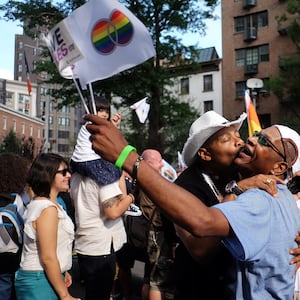In this special series, LGBT celebrities and public figures talk to Tim Teeman about the Stonewall Riots and their legacy—see more here.
Guinevere Turner is an actor (Go Fish, The L Word) and screenwriter.
When/how did you first hear about the Stonewall Riots, and what did you make of it?
I really first learned about Stonewall while reading Leslie Feinberg’s novel Stone Butch Blues when I was but a pup—probably 21 years old. This prompted me to learn my LGBTQ history, and I read more and talked to the older generation about it. (It was 1989, so you know, no Googling. Just good old-fashioned asking your elders!)
What is their significance for you?
A deep pride! And at the time I started to really understand what had happened at Stonewall, I was very involved in ACT UP, HIV/AIDS activism, and Queer Visibility activism, so these were my ForeMothers! An inspiration, a demand even, to keep that level of resistance alive.
How far have LGBT people come since 1969?
Perhaps because I’m 50, I have a tendency to say “FAR!” because when I was growing up and coming out, there were no LGBTQ people on TV (well, Billy Crystal in Soap?) and of course so much of the legislation and visibility simply wasn’t there. Or, I should say, it was all seeming like it was on the upswing until November of 2016. Now the basic things we fought for seem in jeopardy. It’s terrifying, actually.
What would you like to see, LGBT-wise, in the next 50 years?
More of us in government, of course, and positions of power in general. I want to see NO MORE SUICIDES from LGBTQ young people. It’s a disgrace.
I dream of a generation of people for whom sexuality and gender expression is whatever a person wants it to be, and no one questions your choices or your imperatives for a hot second. It should be as easy and understood as telling someone your name or where you were born. “Oh, OK.” Stuff no one can take issue with because it just is.


